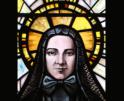
Culture
Tradition has it that because the feast day of this woman named after light itself fell in the depths of the winter solstice, she should be celebrated as the light in the darkness of such long northern nights.
When I was a child, astronomy fascinated me. I was stunned to learn that the light gleaming from the stars I saw was actually ancient light that had left those stars thousands, hundreds of thousands, or millions of years ago.
I was only seeing the light when I did because it took so many "light years" for that radiance to reach my line of sight. The time and distances expressed in light years were impossible for me to comprehend both then and now.
The very idea of them made me feel very small in a very good way.
In these weeks of dark December, light is very much on my mind . . .
Each week of Advent, a new candle is lit.
Each day closer to December 21 is a day closer to the time when daylight hours will once again wax rather than wane.
Windows are filled with candles, lawns burst with Christmas lights both sacred and tacky, and the trees that will grace our homes, church yards and town squares will be lit with joy.
I challenge you to find an Advent song that does not bemoan the darkness or a Christmas hymn that does not rejoice in a sacred starlit night or the burst of a holy dawn. It's a harder task than you might think!
For me, in a particular way, I think of light on December 13 when my family -- and the Church over the world -- celebrates St. Lucy's Day. With her big day tucked into the heart of Advent and the anticipation of Christmas, my patron saint can get lost in the shuffle.
Very little is known with certainty about St. Lucy. She was born in Sicily and died the death of a martyr at the turn of the 4th century. She was killed during a time of brutal persecution of Christians during the reign of Diocletian. Accounts of the horrific details of her death vary -- but the strength with which she faced death is common to all accounts of her life.
The name "Lucy" comes from the Latin word for "light." Truly, the celebration of her day is a celebration of great light. Indeed, while St. Lucy is celebrated with great enthusiasm in her native Italy, through the centuries she has become a particular favorite among Scandinavians -- particularly in Sweden. Tradition has it that because the feast day of this woman named after light itself fell in the depths of the winter solstice, she should be celebrated as the light in the darkness of such long northern nights. She has been celebrated there for centuries with songs and a charming ritual in which young girls wear crowns of candles in their hair while serving special breakfast cakes that day. (For the record, I am a fan of candles and of cake. Yet, I am cautious enough to be glad that this is not an Italian tradition. I could easily see this adventure with fire going very badly for me.)
These celebrations make me think again of my early fascination with light years. Stars that burned so many millennia ago still light up the evening sky. So, too, a good and holy woman who lived years ago still lights up the world. So many generations removed from her, we still tell the stories of her life. We still celebrate her at Mass on Dec. 13. Those with ailments of the eye still seek her intercession. We still dedicate parishes to her patronage. Her name is still recited in the Canon of the Mass (along with Felicity, Perpetua, Agatha, Agnes, Cecilia, and Anastasia -- also good and holy women who lit up the world in their own ways).
In the darkness of mid-December, I think of that light that shone long ago in the bloody persecution of Diocletian's day. She was my ancestor in faith.
I think of the light left behind by good and holy people unknown to me and am grateful that they lived the lives they led. They are also my ancestors in faith.
I hope that we who are traveling through this life today will find in them some guidance on how to live lives that leave behind some small light to brighten the paths of those who will walk through life long after us. It still defies my comprehension that the starlight I see today is light that shone so long ago. That still fills me with awe. But it also fills me with awe that there are those who have lived, do live, and will live their lives in ways that give light to the world so long after their lives on earth have ended.
I hope that you will join me in celebrating Dec. 13 in a special way (perhaps sans candle crowns!). After Dec. 13 has passed, may St. Lucy inspire us all to live lives that light up the world in the todays and the tomorrows of ordinary times.
Recent articles in the Culture & Events section
-
Scripture Reflection for April 14, 2024, Third Sunday of EasterDeacon Greg Kandra
-
St. Helena's House is established in the South EndThomas Lester
-
Is this synodality?Russell Shaw
-
Poking the hornet's nest of IVFFather Tadeusz Pacholczyk
-
A eucharistic word: MissionMichael R. Heinlein


















